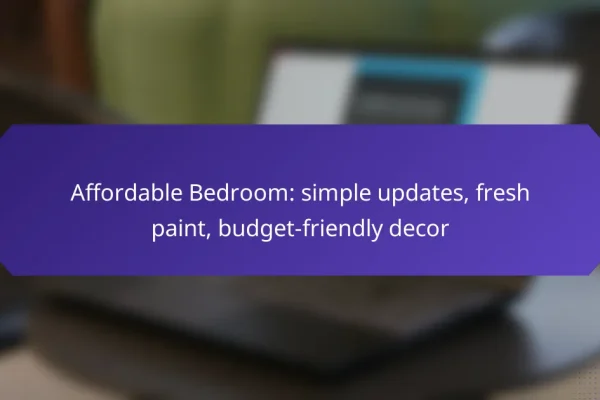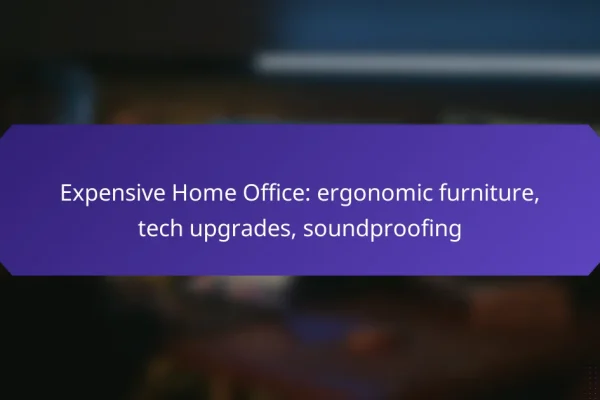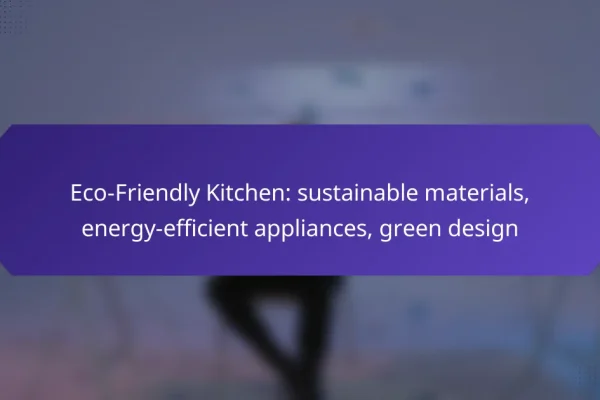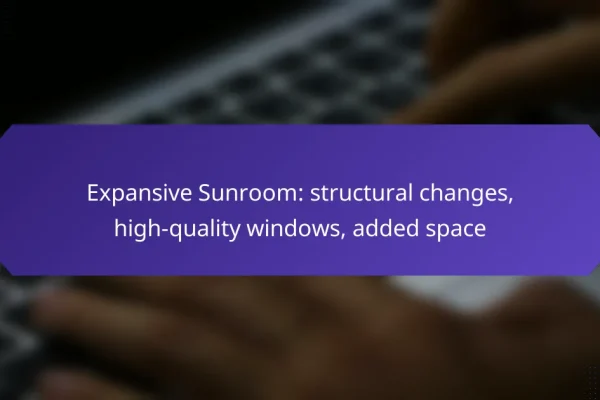What are the costs of kitchen renovations in Canada?
The costs of kitchen renovations in Canada can vary significantly based on the scope of the project, materials used, and location. Homeowners typically spend anywhere from CAD 15,000 to CAD 50,000, with high-end remodels exceeding this range.
Average cost range for kitchen renovations
On average, kitchen renovations in Canada can range from CAD 15,000 for minor updates to over CAD 50,000 for extensive remodels. A mid-range renovation usually costs between CAD 25,000 and CAD 35,000, which may include new cabinets, countertops, and appliances.
For luxury renovations, costs can easily surpass CAD 75,000, especially if custom cabinetry and high-end appliances are involved. It’s essential to set a realistic budget based on your specific needs and preferences.
Factors influencing kitchen renovation costs
Several factors can influence the overall costs of kitchen renovations, including the size of the kitchen, the complexity of the design, and the choice of materials. Larger kitchens generally require more materials and labor, leading to higher expenses.
Labor costs can also vary by region, with urban areas typically charging more due to higher demand. Additionally, unexpected issues such as plumbing or electrical upgrades can increase the budget, so it’s wise to include a contingency fund of about 10-20% of your total budget.
Cost breakdown by materials
The choice of materials plays a crucial role in determining the costs of kitchen renovations. For example, laminate countertops may cost around CAD 30 to CAD 50 per square foot, while granite can range from CAD 70 to CAD 150 per square foot.
Cabinetry can also vary widely; stock cabinets may start at CAD 100 per linear foot, while custom cabinets can exceed CAD 500 per linear foot. Flooring options, such as vinyl, tile, or hardwood, each come with their own price points, affecting the overall renovation budget significantly.
What are the costs of bathroom renovations in Canada?
Bathroom renovations in Canada typically range from several thousand to tens of thousands of Canadian dollars, depending on the scope and quality of materials used. Homeowners should budget carefully, as costs can vary significantly based on design choices and labor rates in different regions.
Average cost range for bathroom renovations
The average cost for a bathroom renovation in Canada usually falls between CAD 10,000 and CAD 25,000. Basic updates, such as new fixtures and paint, can be done for around CAD 5,000, while full remodels with high-end finishes may exceed CAD 30,000.
For a mid-range renovation, expect to spend about CAD 15,000 to CAD 20,000, which typically includes new cabinetry, countertops, and flooring. Always get multiple quotes to ensure you are getting a fair price for your project.
Factors influencing bathroom renovation costs
Several factors can impact the overall costs of bathroom renovations, including the size of the bathroom, the complexity of the design, and the quality of materials chosen. Larger bathrooms generally require more materials and labor, increasing the total expense.
Labor costs can vary widely depending on the region and the experience of the contractors. Additionally, unexpected issues such as plumbing or electrical work can arise during renovations, leading to increased costs. It is wise to set aside a contingency budget of 10-20% for unforeseen expenses.
Cost breakdown by fixtures
When budgeting for a bathroom renovation, it’s essential to consider the costs associated with various fixtures. For instance, a standard toilet can range from CAD 200 to CAD 1,000, while vanities typically cost between CAD 500 and CAD 3,000, depending on size and materials.
Shower installations can vary significantly, with basic models starting around CAD 1,000 and luxury options exceeding CAD 5,000. Flooring choices also affect costs; ceramic tiles may cost CAD 5 to CAD 15 per square foot, while high-end options like natural stone can go up to CAD 30 per square foot. Prioritize fixtures that fit your budget while ensuring quality and durability.
What are the costs of basement renovations in Canada?
The costs of basement renovations in Canada typically range from CAD 10,000 to CAD 50,000, depending on the scope of the project and the materials used. Homeowners should consider their budget, desired features, and local market conditions when planning their renovations.
Average cost range for basement renovations
The average cost for basement renovations in Canada can vary significantly based on factors such as location and the extent of the work. Generally, homeowners can expect to spend between CAD 15,000 and CAD 30,000 for a basic renovation, while more extensive projects can exceed CAD 50,000.
For example, a simple finishing job might cost around CAD 20,000, while adding a bathroom or kitchen can push costs higher. It’s essential to get multiple quotes from contractors to find the best deal for your specific needs.
Factors influencing basement renovation costs
Several factors can influence the overall costs of basement renovations. The size of the space, the complexity of the design, and the quality of materials chosen all play a significant role in determining the final price. Additionally, if structural changes are required, such as underpinning or adding windows, costs will increase.
Another important consideration is the local labor market. In regions with a high demand for construction services, labor costs may be higher, impacting the overall renovation budget. Homeowners should also factor in permits and inspections, which can add to the total expenses.
Cost breakdown by finishing options
When planning a basement renovation, it’s helpful to understand the cost breakdown by finishing options. Basic finishes, such as drywall and flooring, may cost around CAD 20 to CAD 50 per square foot. Upgrading to higher-end materials, like hardwood flooring or custom cabinetry, can raise costs to CAD 100 per square foot or more.
Here’s a quick overview of potential costs for various finishing options:
Basic drywall and carpet: CAD 20 – CAD 30 per square foot
Mid-range finishes (laminate flooring, standard cabinetry): CAD 50 – CAD 70 per square foot
High-end finishes (hardwood, custom designs): CAD 80 – CAD 150 per square foot
Choosing the right finishes can significantly impact both the budget and the overall aesthetic of the basement. Prioritize your needs and preferences to make informed decisions that align with your financial plan.
What are the costs of home additions in Canada?
The costs of home additions in Canada can vary significantly based on factors such as location, size, and type of addition. Generally, homeowners can expect to spend anywhere from CAD 20,000 to CAD 100,000 or more, depending on their specific project requirements.
Average cost range for home additions
The average cost range for home additions in Canada typically falls between CAD 30,000 and CAD 80,000. Smaller projects, like adding a simple room, may start around CAD 20,000, while larger expansions, such as multi-room additions, can exceed CAD 100,000. Costs can vary widely based on the province and local market conditions.
Factors influencing home addition costs
Several factors can influence the overall costs of home additions. These include the complexity of the design, the materials chosen, and labor costs in the region. Additionally, obtaining necessary permits and adhering to local building codes can add to the total expense.
Another important consideration is whether the addition requires foundation work or structural changes, which can significantly increase costs. Homeowners should also factor in potential disruptions to their daily lives during the construction process.
Cost breakdown by type of addition
Different types of home additions come with varying costs. For instance, a basic room addition may cost around CAD 30,000 to CAD 50,000, while a second-story addition can range from CAD 80,000 to CAD 150,000. Sunrooms and deck additions typically fall between CAD 15,000 and CAD 40,000.
It’s essential to assess the specific needs and goals of the project to determine the most cost-effective approach. Homeowners should consider consulting with contractors to get detailed estimates based on their desired addition type and local market rates.
What financing options are available for renovation projects?
Several financing options can help fund renovation projects, including home equity loans, personal loans, and government grants. Each option has distinct features, benefits, and considerations that can affect your choice based on your financial situation and project scope.
Home equity loans
Home equity loans allow homeowners to borrow against the equity they have built in their property. Typically, these loans offer lower interest rates compared to personal loans, as they are secured by the home itself. Borrowers can usually access a percentage of their home’s value, often ranging from 80% to 90% of the equity.
When considering a home equity loan, it’s essential to evaluate your ability to repay the loan and the potential impact on your home’s value. If property values decline, you may owe more than your home is worth. Always compare different lenders to find the best terms and interest rates.
Personal loans
Personal loans are unsecured loans that can be used for various purposes, including home renovations. These loans typically have higher interest rates than home equity loans since they are not backed by collateral. Borrowers can usually access amounts ranging from a few thousand to tens of thousands of dollars.
When opting for a personal loan, consider your credit score, as it significantly influences the interest rate and terms you may receive. It’s advisable to shop around and compare offers from multiple lenders to secure the best deal. Be cautious of any fees associated with the loan, as they can add to the overall cost.
Government grants and incentives
Government grants and incentives can provide financial assistance for renovation projects, particularly those focused on energy efficiency or historical preservation. These programs vary by location and may cover a portion of the renovation costs or offer tax credits.
To access these funds, research local, state, and federal programs that may apply to your project. Be mindful of application deadlines and eligibility requirements, as they can vary widely. Utilizing these grants can significantly reduce your renovation expenses, making it a worthwhile option to explore.
How to choose a contractor for renovation projects?
Choosing a contractor for renovation projects involves evaluating their qualifications, experience, and reliability. A well-selected contractor can significantly impact the quality and cost of your renovation.
Key criteria for selecting a contractor
When selecting a contractor, consider their licensing, insurance, and experience in your specific type of renovation. Verify that they hold the necessary permits and are compliant with local regulations, which can vary by region.
Additionally, assess their portfolio of past projects to gauge their workmanship and style. Look for contractors who have positive reviews and testimonials from previous clients, as this can provide insight into their reliability and professionalism.
Questions to ask potential contractors
Prepare a list of questions to ask potential contractors during your initial meetings. Inquire about their experience with similar projects, estimated timelines, and payment structures. It’s essential to understand how they handle unexpected issues that may arise during the renovation.
Ask for references and follow up with them to get a sense of the contractor’s work ethic and communication style. Clarifying these points upfront can help prevent misunderstandings and ensure a smoother renovation process.
What are the emerging trends in home renovations?
Emerging trends in home renovations focus on sustainability, smart technology integration, and multifunctional spaces. Homeowners are increasingly prioritizing eco-friendly materials and energy-efficient designs while incorporating technology that enhances convenience and efficiency.
Sustainable Materials
Sustainable materials are becoming a key component of modern renovations. Homeowners are opting for recycled, reclaimed, or rapidly renewable resources, such as bamboo flooring or recycled glass countertops. This shift not only reduces environmental impact but can also lead to long-term savings on energy costs.
When selecting sustainable materials, consider certifications like FSC (Forest Stewardship Council) for wood products or Energy Star ratings for appliances. These indicators help ensure that your choices are both eco-friendly and high-quality.
Smart Home Technology
Smart home technology is increasingly integrated into renovation projects, enhancing convenience and security. Features like smart thermostats, automated lighting, and security systems can be controlled remotely, providing homeowners with greater control over their living environments.
Investing in smart technology can lead to energy savings and increased property value. However, it’s essential to ensure compatibility among devices and consider the initial investment versus long-term savings.
Multifunctional Spaces
Renovations are increasingly focused on creating multifunctional spaces that maximize utility. Homeowners are transforming underutilized areas into home offices, gyms, or guest suites, reflecting the growing trend of remote work and flexible living arrangements.
When designing multifunctional spaces, prioritize flexibility and storage solutions. For example, consider foldable furniture or built-in storage to maintain an organized and adaptable environment. This approach can enhance both comfort and functionality in your home.















